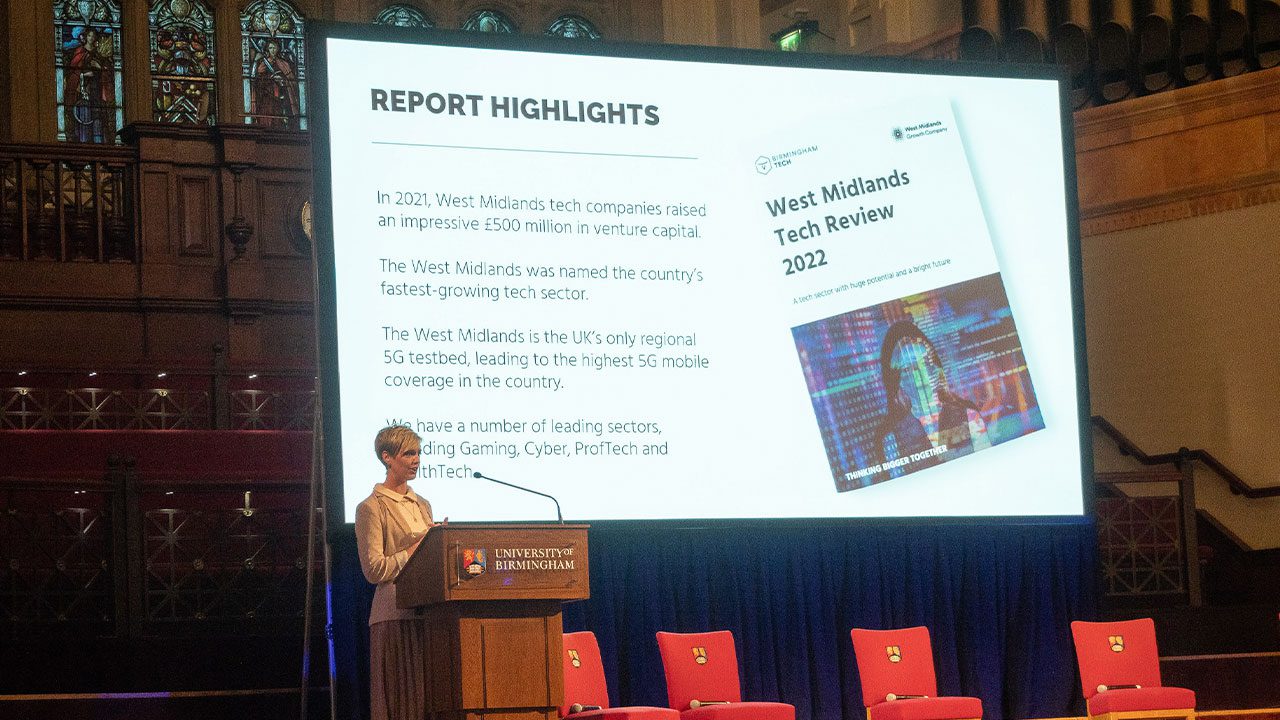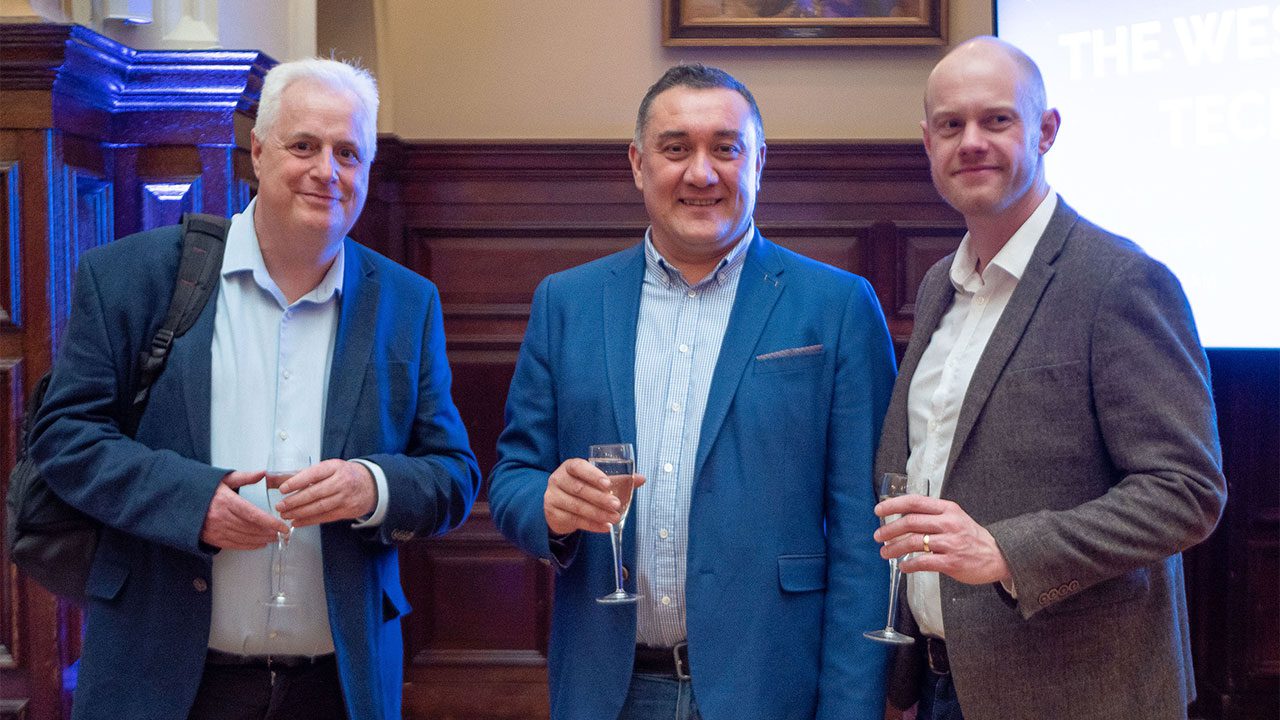Mike Lewis Discusses Why Convergence Will Be King – West Midlands Tech Review 2022

In light of the West Midlands Tech Review 2022 report, Mike Lewis, WMGC’s Sector Lead for Digital & Creative Technologies, explores how the West Midlands’ world-class digital capabilities are set to drive significant growth across existing and emerging sectors in the years to come.
Birmingham Tech and the West Midlands Growth Company recently published the West Midlands Tech Review 2022 (available on Birmingham Tech‘s website), a new report looking at all aspects of West Midland’s technology sector and its digital industries.
A ringing endorsement of the cutting-edge capabilities across the region, it covers the West Midlands’ key tech and creative economic drivers, details of its 53,000-strong technology workforce (set to double over the next few years), its Digital Roadmap for future technology skills and employment, and why the region has been recently identified by government as the fastest growing technology cluster in the UK.
And while it includes updates on some of the nation-leading sector strengths some may be familiar with – such as the thriving games industry centred around Leamington Spa, the significant telecoms and 5G expertise we enjoy, and the extensive technology R&D ecosystem which operates throughout the region – the report also looks at emerging markets including digital healthcare and FinTech.
But what’s exciting about the report isn’t just the size, scale and growth potential the region currently enjoys within its existing technology sectors – which the government expects will increase by a further £2.7bn by 2025 – it’s the cross-cutting digital capabilities it highlights which has the potential to transform our entire economy.

Photo: Mike Lewis at the event with Jeff Baker (middle) and Jack Stockport (right) from WMGC partner, SF Recruitment.
The gamification opportunity
Currently, 25% of all UK games are produced in the West Midlands[1] by over 120 different businesses, including global names like Ubisoft, Playground, Sega Hardlight and Codemasters.
This concentration also means we have over 3,000 games professionals with high-value skills in sophisticated game design, leading-edge software development, AI, Virtual Reality (VR), User Experience (UX) and Augmented Reality (AR).
In addition to driving more growth within gaming, social gaming and eSports (already a £750m business in its own right), this in-demand skill set is vital for consumer brands and B2B businesses who want to embed immersive digital experiences into their future products and services.
Further, the Serious Games market – where gaming environments and techniques are used to educate or train users and employees, or to promote a product or service in an engaging and entertaining manner, is projected to reach £25bn by 2030.[2]
From the Metaverse to MedTech
Consider the high levels of interest being generated by concepts like the Metaverse (which global investment bank Citi recently predicted could be worth £9.9 trillion by the end of the decade[3]), and how the demand for more virtual, interactive environments for all types of organisations is set to ramp up, and you soon start to see how our region’s rich and deep gaming pedigree will unlock additional high-growth opportunities.
Similarly, our strengths within disciplines like gaming are set to massively impact the healthcare sector. Already a national leader in fields such as genomics, clinical trials and medical devices, the West Midlands is also developing a reputation for innovation and growth within Medtech and Digital Health markets.
These, and many other emerging data-driven healthcare subsectors, will be increasingly dependent on UX, VR and other immersive technologies to deliver more personalised and intuitive healthcare interventions – our region’s gaming industry is rich with such expertise.
Skills drawn from the region’s advanced manufacturing sector are also set to revolutionise our approach to healthcare, with experience in Industry 4.0 applications – like 3D printing, predictive maintenance, digital twins and remote sensors – being applied to the manufacture of increasingly bespoke and ‘smart’ assistive equipment, medical devices, and health monitoring systems.
A cyber-secure future for business
Another sector set for massive growth is cybersecurity, which is predicted to globally grow from £118bn in 2022 to £287bn by 2029.[4] Much of this growth is set to be centred around infrastructure and industrial cyber-secure safeguards, as well as FinTech and other ‘cloud-based’ professional and consumer services. The West Midlands – which is already home to the Cyber Resilience Centre, is a key player in the broader Midlands Cyber Quarter initiative, and was chosen by government as the location to launch its National Cyber Strategy last December – is primed to take advantage of the global demand for secure and reliable cyber provision.
This is driven by our existing expertise in high-grade cybersecurity gained through the presence of national Critical Infrastructure providers HQ’d in the region – including several major energy and water companies – together with a mass of global aerospace, defence and transport businesses based here.
Our massive ProfTech potential
We also have a high volume of global financial firms – and other providers of commercially-sensitive services who are already investing massively in sophisticated and robust cybersecurity protection. And it’s such financial firms and other professional services businesses driving the rapid expansion of the region’s FinTech and ProfTech sectors.
Already a £400m+ market, the West Midlands is home to SuperTech – the country’s only ProfTech SuperCluster – and The Engine Room, Europe’s largest FinTech innovation hub.
A connected, collaborative R&D culture
The digital convergence – and maximising the benefits of having an agile, multi-disciplinary tech workforce with transferable skills – is not possible without the proper connectivity, R&D assets and support ecosystem. Digital convergence is where the West Midlands also enjoys many significant strategic and commercial advantages.
For example, we have the UK’s most extensive 5G coverage, the UK’s first multi-city 5G testbed and the UK’s first 5G accelerator. These are already opening up new investment opportunities in areas such as Private Networks, IoT and IIoT.
Such connectivity enables us to be a global leader in Future Mobility solutions, including driverless vehicles, electrification, and the more comprehensive Smart Cities agenda.
Coupled with that, we have over 20 industry-focussed and collaborative digital R&D hubs and tech testbeds, both academic and business-led.
These include internationally recognised centres of excellence such as the Warwick Manufacturing Group, Innovation Birmingham, the Sci-Tech Innovation Hub in Wolverhampton, and the West Midlands Health Technologies Cluster, which are already bringing private and public sector partners together to collaborate, innovate and explore ideas based on a sector-agnostic and disruptive approach to technology.
A blueprint for growth
So, while I’m delighted that the West Midlands Tech Review 2022 has been published – showcasing so many of the significant initiatives, case studies and strengths that we have across the region on a sector-by-sector basis – I believe its longer-term value will be how it’s captured our overarching technology offer; helping us to see where the synergies, transferable skills and convergence opportunities are set to come from in the very near future.
You can request a copy of the full report at www.birmingham.tech/west-midlands-tech-review-report/
References:
[1] Silicon Spa: The Warwickshire town with a booming gaming industry[2] Serious Games Market Statistics: 2030
[3] The Metaverse Could Have 5 Billion Users and a Value of $13 Trillion, Citi Predicts
[4] Cyber Security Market Size, Share & COVID-19 Impact Analysis [Removed from web]